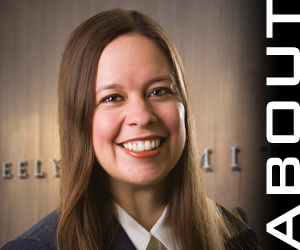Ethics Engaged | Spring 2017
Defending Truth
In the words of Mark Twain, “Always tell the truth. That way, you don’t have to remember what you said.”

Elizabeth Pittelkow Kittner
CFO and Managing Director, Leelyn Smith LLC
Exploring Ethics in Business & Finance Today
HAVE YOU HEARD THAT THE TRUTH MATTERS LESS WHEN YOU ARE DEFENDING YOURSELF? A WHITE LIE HERE OR THERE DOES NO HARM, RIGHT? ACTUALLY, IT DOES.
Take famed criminologist Donald Cressey and his fraud triangle, which hypothesizes that an ordinary person will commit fraud under the weight of three factors ever present in our business world: Pressure, opportunity and rationalization. More recently, David T. Wolfe’s and Dana R. Hermanson’s fraud diamond takes a slightly modified approach, offering the idea that fraudulent behavior is driven by incentive, opportunity, rationalization and capability.
Wondering how defending yourself and the little white lies you may tell in doing so fall into this equation? I would say we feel pressure (to stay employed) and see an incentive (to guard our reputations and earn more).
As compassionate human beings, we often are forgiving of the lies and unethical behaviors used for self-defense. The trouble there is that lying easily leads to broken relationships, lost business and damaged reputations.
In most instances, telling the truth helps you both physically and mentally. Research by Anita Kelly, a psychology professor at the University of Notre Dame in Indiana, found that telling fewer lies per week relieved stress and sadness, and even resulted in fewer sore throats and headaches.
That said, a study by Shaul Shalvi of the University of Amsterdam, and Ori Eldar and Yoella Bereby-Meyer of Ben-Gurion University of the Negev, concludes that people who suddenly find themselves in an ethical dilemma do not necessarily default to ethical behavior; instead, they default to self-protection. In other words, people lie more and put themselves first when they are under pressure. How can we apply this research to our profession?
For starters, if we accuse our colleagues or clients of a negative behavior on the spot, we may not get honest answers to our honest questions. In fact, it may be in our best interests to mindfully pause, process, and only then proceed with a question or response. The key point here is that when we have more time to think, we often will not see justifications to lie.
Considering that, Pamela Meyer, author of "Liespotting," says we lie anywhere from 10 to 200 times a day. You are probably thinking that it is impossible to lie that much. However, even something as seemingly innocuous as exaggerating or omitting a detail is, in fact, a lie. For example, a client may ask you to report charitable contributions in excess of what was actually contributed for the year. Or, a client may tell you that an asset is not impaired if he or she would prefer not to write it down on the financials.
Purposely omitting details—say, in a financial statement disclosure—is lying, especially when those details are important in making a judgment or decision.
So how do we stop lying? Truth telling, like other positive behaviors, should become a habit. The more you tell people the truth, the easier it will be to always tell the truth. Find people you trust to hold you accountable. Discuss decisions with them to make your thought processes transparent. Write down your thoughts about a situation (why your client should not take an aggressive tax position, for example) so you can be better prepared to answer questions about difficult topics. The more prepared you are, the less defensive you will be, and the more likely to tell the truth.
Integrity and truth should be staples in every code of ethics. If you do not have one, then it is imperative that you write one. Do have one? Then study, share and promote it! Building a culture of ethics will help you live your ethics.